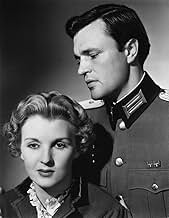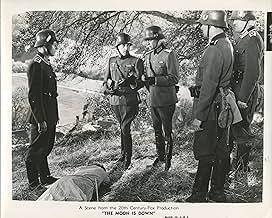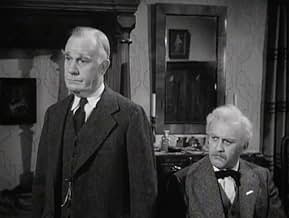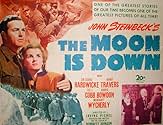CALIFICACIÓN DE IMDb
7.0/10
605
TU CALIFICACIÓN
Durante la ocupación nazi de Noruega, un pequeño pueblo noruego lucha por hacer frente a los invasores y algunos lugareños optan por la colaboración, mientras que otros prefieren la resisten... Leer todoDurante la ocupación nazi de Noruega, un pequeño pueblo noruego lucha por hacer frente a los invasores y algunos lugareños optan por la colaboración, mientras que otros prefieren la resistencia armada.Durante la ocupación nazi de Noruega, un pequeño pueblo noruego lucha por hacer frente a los invasores y algunos lugareños optan por la colaboración, mientras que otros prefieren la resistencia armada.
- Dirección
- Guionistas
- Elenco
- Premios
- 6 premios ganados en total
Cedric Hardwicke
- Col. Lanser
- (as Sir Cedric Hardwicke)
Frederic Brunn
- German Soldier
- (as Frederick Brunn)
Ernst Deutsch
- Maj. Hunter
- (as Ernest Dorian)
Ludwig Donath
- Hitler's Voice
- (as Louis Donath)
Richard Abbott
- Villager
- (sin créditos)
Louis V. Arco
- Schumann
- (sin créditos)
Georgia Backus
- Villager
- (sin créditos)
John Banner
- Lt. Prackle
- (sin créditos)
Trevor Bardette
- Knute Pierson - Foreman
- (sin créditos)
- Dirección
- Guionistas
- Todo el elenco y el equipo
- Producción, taquilla y más en IMDbPro
Opiniones destacadas
"Haven't we some little right to life?"
To that question by one of the characters in the Nazi-conquered Norwegian town, actually, no, not when governments say "Fight. Destroy. Kill."
When governments say "You must have a number" and "You must carry this card embossed with that number" or "You must wear this uniform" and "You must kill that other human being," you are being considered as property, and that means you no longer have rights.
At least that is how governments want you to believe.
You are expected to obey, not think. Obey, not have desires of your own. You are a cog in the great machinery of the state.
"The Moon Is Down" was intended specifically as anti-Nazi propaganda, coming as it did shortly after the United States entered World War II, but there is a deeper and more universal meaning.
Even Nazis, or at least German soldiers lured or forced into war by German leaders of the National Socialist German Workers Party, or Nazis, have some vestiges of humanity -- at least some of them.
Told their lives belong to the state, to the fatherland, and that they must act, even die, for purposes of the Master Race, and not to think of or for themselves, still sometimes selfish desires rise to the fore, and such basics as love or freedom motivate more than do orders.
Death and destruction are inevitable results of the subordination of individuals and individuality to the state, to the society, to the race.
Humanity's bloodiest century, the twentieth, proved the truth of that statement with the rise of Nazism and Communism, both of which demanded the submersion of individuals into the mass.
When individual humans no longer matter, mass murders become mere matters of strategy, or "the continuation of politics by other means," as von Clausewitz is quoted.
Few movies illustrate the horror and degradation of war and governments better than "The Moon Is Down," which was presented on Turner Classic Movies the night of 2 January 2017. I had read the John Steinbeck book decades ago and not appreciated that message, not even seen it, that early in my life.
Now, though, after long years lived with the threat of war or some act of tyranny hanging over me nearly every day of that time, I do appreciate the tale and its moral, or at least the moral I now see.
Steinbeck wrote this, a good summation of the meaning of "The Moon Is Down": "Free men cannot start a war, but once it is started, they can fight on in defeat. Herd men, followers of a leader, cannot do that, and so it is always the herd men who win battles and the free men who win wars."
We are engaged on a daily basis in an ongoing war of individualism versus a leader, versus the mob, versus the collective, versus the state, or, especially these last few decades, versus a murderous and destructive movement some try to call a religion.
I would like to recommend "The Moon Is Down" in both book and movie form, not for entertainment, since there is no joy or pleasure in either, but for the object lesson: Do not let politicians and governments control your life.
To that question by one of the characters in the Nazi-conquered Norwegian town, actually, no, not when governments say "Fight. Destroy. Kill."
When governments say "You must have a number" and "You must carry this card embossed with that number" or "You must wear this uniform" and "You must kill that other human being," you are being considered as property, and that means you no longer have rights.
At least that is how governments want you to believe.
You are expected to obey, not think. Obey, not have desires of your own. You are a cog in the great machinery of the state.
"The Moon Is Down" was intended specifically as anti-Nazi propaganda, coming as it did shortly after the United States entered World War II, but there is a deeper and more universal meaning.
Even Nazis, or at least German soldiers lured or forced into war by German leaders of the National Socialist German Workers Party, or Nazis, have some vestiges of humanity -- at least some of them.
Told their lives belong to the state, to the fatherland, and that they must act, even die, for purposes of the Master Race, and not to think of or for themselves, still sometimes selfish desires rise to the fore, and such basics as love or freedom motivate more than do orders.
Death and destruction are inevitable results of the subordination of individuals and individuality to the state, to the society, to the race.
Humanity's bloodiest century, the twentieth, proved the truth of that statement with the rise of Nazism and Communism, both of which demanded the submersion of individuals into the mass.
When individual humans no longer matter, mass murders become mere matters of strategy, or "the continuation of politics by other means," as von Clausewitz is quoted.
Few movies illustrate the horror and degradation of war and governments better than "The Moon Is Down," which was presented on Turner Classic Movies the night of 2 January 2017. I had read the John Steinbeck book decades ago and not appreciated that message, not even seen it, that early in my life.
Now, though, after long years lived with the threat of war or some act of tyranny hanging over me nearly every day of that time, I do appreciate the tale and its moral, or at least the moral I now see.
Steinbeck wrote this, a good summation of the meaning of "The Moon Is Down": "Free men cannot start a war, but once it is started, they can fight on in defeat. Herd men, followers of a leader, cannot do that, and so it is always the herd men who win battles and the free men who win wars."
We are engaged on a daily basis in an ongoing war of individualism versus a leader, versus the mob, versus the collective, versus the state, or, especially these last few decades, versus a murderous and destructive movement some try to call a religion.
I would like to recommend "The Moon Is Down" in both book and movie form, not for entertainment, since there is no joy or pleasure in either, but for the object lesson: Do not let politicians and governments control your life.
The Germans invade Norway. Mayor Orden (Henry Travers) is a respected leader of the small port town Selvik. Their young men are off to train when an invasion takes them by surprise. They are ambushed by the Germans led by Colonel Lanser (Cedric Hardwicke). George Corell is the traitorous storekeeper and Dr. Albert Winter (Lee J. Cobb) calls him out. Lanser needs the iron mines to continue operating and demands cooperation from Orden's town.
This is adapted from author John Steinbeck's novel. It is solidly made with good actors. It's more of an intellectual work rather than a visceral thriller. There are some long exchanges which dig into the concepts of occupation. It keeps the movie somewhat static and the intensity suppressed. It doesn't shy away from the brutality but it's not an action movie. This is a solid fairly realistic wartime movie rallying the peoples under occupation. As propaganda, it is heroic and hits many of the right notes.
This is adapted from author John Steinbeck's novel. It is solidly made with good actors. It's more of an intellectual work rather than a visceral thriller. There are some long exchanges which dig into the concepts of occupation. It keeps the movie somewhat static and the intensity suppressed. It doesn't shy away from the brutality but it's not an action movie. This is a solid fairly realistic wartime movie rallying the peoples under occupation. As propaganda, it is heroic and hits many of the right notes.
In a small Norwegian mining town where all the signs are in English, the Nazis invade, under the command of Cedric Hardwicke. Gradually, their cruel policies lead to the rising of the townsmen in The Moon is Down, based on a novel by John Steinbeck.
Director Irving Pichel -- he has a small part as an innkeeper -- works from a low-key script by Nunnally Johnson, and the entire film is played in an engagingly low-key fashion by Hardwicke, the inimitable Henry Travers as the town's mayor, and Lee J. Cobb as the mayor's friend. It's an effective propaganda film from 20th Century-Fox right in the middle of the U.S.'s war.
Director Irving Pichel -- he has a small part as an innkeeper -- works from a low-key script by Nunnally Johnson, and the entire film is played in an engagingly low-key fashion by Hardwicke, the inimitable Henry Travers as the town's mayor, and Lee J. Cobb as the mayor's friend. It's an effective propaganda film from 20th Century-Fox right in the middle of the U.S.'s war.
This movie is based on one of John Steinbeck's lesser-known novels. I have a feeling that Steinbeck wrote the novel for much the same reason that the movie was made: Propaganda in support of the War.
Nunnally Johnson wrote the play for the movie, based on Steinbeck's novel, just as he had written the screenplay for Steinbeck's The Grapes of Wrath (1940). Nunnaly's wife, Dorris Bodon, had an acting role of both of these movies. The movie's director, Irving Pichel, had a small unaccredited role, here, as the Inn Keeper. Natalie Wood made her first screen appearance in this movie and then went on to make her 2nd, 3rd and 4th movie appearances in Irving Pichel-directed movies: Happy Land (1943), Tomorrow Is Forever, (1943), and The Bride Wore Boots (1946).
This movie is not so much star-oriented as it is character–oriented, with great character actors taking on the main roles. Cedric Hardwick plays Col Lanser, the coy and pragmatic Nazi officer who is assigned to take over a small Norwegian mining village for it rich iron mines. After the German victory, the village historian, Dr. Winter (Lee J. Cobb), acerbically jokes with its mayor, Orden (Henry Travers), that the German victory only took 4 hours and the victory was announced before anyone know there was even a battle.
The "victory" takes place as hundreds of German paratroopers are dropped into the small village while its tiny militia is enjoying a picnic and shooting contest in the country. The picnic had been arranged by the local store keeper, George Corell (E.J. Ballantine), with the hope that he will be quickly advanced up the German ranks and sent to Berlin.
When Col Lanser interviews Dr. Winter, the mayor, and his wife, Sarah (Margaret Wycherly), they are outraged by Corell's treachery. When Lanser tells Orden that the miners must work harder to supply iron for Germany, Odren tells him that Germans do not understand the people they conquer--they never have, and they never will. Free people do not take orders from a dictator, they live to be free and their freedom is build around an idea—not an order from a dictator. Just as Odren says, the people of the village are not easily pushed around. It is easier to conquer a country in battle than it is to occupy it by telling its free people what they MUST do to stay alive.
The movie demonstrates this and it also has scenes that demonstrate that soldiers are trained to fight and win territory–not to manage the people they have vanquished. Not only do the Norwegians slow down their work in the mines, they also commit acts of sabotage on those mines, and engage in other acts of resistance against the Germans who occupy them. This only increases as the RAF drops parachuted packets of dynamite to help them with these many "small" acts of resistance such as blowing up bridges and roads and other means of production and distribution of the mined iron that is to be used by Nazis in their war.
In the end, the German soldiers grow tired of being hated by the locals and guarding against their acts of resistance rather than fighting wars. This is demonstrated when one soldier, Lt. Tonder (Peter van Eyck), tries to just enjoy the simple company of one Norwegian woman, Molly Morden (Dorris Bowdon). Though she is lonely and is very hungry— food is being withheld from the families in order to feed the soldiers and iron miners—she remembers that Tonder was responsible for killing her husband. So, she stabs Tonder to death with a pair of scissors then manages to escape to Sweden.
In the end, "the flies conquer the flypaper."
Nunnally Johnson wrote the play for the movie, based on Steinbeck's novel, just as he had written the screenplay for Steinbeck's The Grapes of Wrath (1940). Nunnaly's wife, Dorris Bodon, had an acting role of both of these movies. The movie's director, Irving Pichel, had a small unaccredited role, here, as the Inn Keeper. Natalie Wood made her first screen appearance in this movie and then went on to make her 2nd, 3rd and 4th movie appearances in Irving Pichel-directed movies: Happy Land (1943), Tomorrow Is Forever, (1943), and The Bride Wore Boots (1946).
This movie is not so much star-oriented as it is character–oriented, with great character actors taking on the main roles. Cedric Hardwick plays Col Lanser, the coy and pragmatic Nazi officer who is assigned to take over a small Norwegian mining village for it rich iron mines. After the German victory, the village historian, Dr. Winter (Lee J. Cobb), acerbically jokes with its mayor, Orden (Henry Travers), that the German victory only took 4 hours and the victory was announced before anyone know there was even a battle.
The "victory" takes place as hundreds of German paratroopers are dropped into the small village while its tiny militia is enjoying a picnic and shooting contest in the country. The picnic had been arranged by the local store keeper, George Corell (E.J. Ballantine), with the hope that he will be quickly advanced up the German ranks and sent to Berlin.
When Col Lanser interviews Dr. Winter, the mayor, and his wife, Sarah (Margaret Wycherly), they are outraged by Corell's treachery. When Lanser tells Orden that the miners must work harder to supply iron for Germany, Odren tells him that Germans do not understand the people they conquer--they never have, and they never will. Free people do not take orders from a dictator, they live to be free and their freedom is build around an idea—not an order from a dictator. Just as Odren says, the people of the village are not easily pushed around. It is easier to conquer a country in battle than it is to occupy it by telling its free people what they MUST do to stay alive.
The movie demonstrates this and it also has scenes that demonstrate that soldiers are trained to fight and win territory–not to manage the people they have vanquished. Not only do the Norwegians slow down their work in the mines, they also commit acts of sabotage on those mines, and engage in other acts of resistance against the Germans who occupy them. This only increases as the RAF drops parachuted packets of dynamite to help them with these many "small" acts of resistance such as blowing up bridges and roads and other means of production and distribution of the mined iron that is to be used by Nazis in their war.
In the end, the German soldiers grow tired of being hated by the locals and guarding against their acts of resistance rather than fighting wars. This is demonstrated when one soldier, Lt. Tonder (Peter van Eyck), tries to just enjoy the simple company of one Norwegian woman, Molly Morden (Dorris Bowdon). Though she is lonely and is very hungry— food is being withheld from the families in order to feed the soldiers and iron miners—she remembers that Tonder was responsible for killing her husband. So, she stabs Tonder to death with a pair of scissors then manages to escape to Sweden.
In the end, "the flies conquer the flypaper."
One of the better World War II propaganda films it has stood the test of time far better than a lot in the era. Possibly because the original source was a novel by one of America's best known authors John Steinbeck.
The story is about the Nazi occupation in a small Norwegian town and it is told from the viewpoint of both the conquered and the conquerors. As such in one of the few films of the era, Nazis are presented as three dimensional people and not just merciless Huns. The film also has no box office name stars which in the long run has probably helped with authenticity.
The Nazis invaded and occupied Norway to gain control of its long Atlantic coast line and prevent supplies from getting to the Soviet Union from Archangel and Murmansk. Except in certain circumstances the interior was left alone. This was one of those circumstances.
The town here has an iron mine which is the chief employer. The Reich wanted that mine, wanted the iron ore production stepped up, hence the occupation. Cedric Hardwicke is the commander of the occupying Nazi army and he deals with the occupational hazards of garrisoning a hostile town and making slave labor of its citizens.
Henry Travers is the mayor and Lee J. Cobb the town doctor and the leading two citizens of the town. Hardwicke tries to work with them and Travers especially tries to explain that you folks just aren't wanted. Hardwicke in fact deliberately refuses to remove Travers from office to put the local Quisling E.J. Ballantine in his place. In the end though he falls back on standard Nazi methods.
Ballantine should be singled out. He did not make too many film appearances and The Moon Is Down is his first. But even Hardwicke and his troops can't stand a traitor.
Peter Van Eyck has an interesting role too. The Scandinavians were viewed in the Nazi racial pecking order as fellow Aryans and the bad reception they got when taking over Denmark and Norway was a bit unsettling to their troops. They were told that occupation and the chance to join the Reich would be welcomed. Van Eyck who's a country kid tries to make friends and it unnerves the hate that he's given in return.
This film is a real gem from the World War II years. It should be rediscovered and evaluated as one of the best films of the era.
The story is about the Nazi occupation in a small Norwegian town and it is told from the viewpoint of both the conquered and the conquerors. As such in one of the few films of the era, Nazis are presented as three dimensional people and not just merciless Huns. The film also has no box office name stars which in the long run has probably helped with authenticity.
The Nazis invaded and occupied Norway to gain control of its long Atlantic coast line and prevent supplies from getting to the Soviet Union from Archangel and Murmansk. Except in certain circumstances the interior was left alone. This was one of those circumstances.
The town here has an iron mine which is the chief employer. The Reich wanted that mine, wanted the iron ore production stepped up, hence the occupation. Cedric Hardwicke is the commander of the occupying Nazi army and he deals with the occupational hazards of garrisoning a hostile town and making slave labor of its citizens.
Henry Travers is the mayor and Lee J. Cobb the town doctor and the leading two citizens of the town. Hardwicke tries to work with them and Travers especially tries to explain that you folks just aren't wanted. Hardwicke in fact deliberately refuses to remove Travers from office to put the local Quisling E.J. Ballantine in his place. In the end though he falls back on standard Nazi methods.
Ballantine should be singled out. He did not make too many film appearances and The Moon Is Down is his first. But even Hardwicke and his troops can't stand a traitor.
Peter Van Eyck has an interesting role too. The Scandinavians were viewed in the Nazi racial pecking order as fellow Aryans and the bad reception they got when taking over Denmark and Norway was a bit unsettling to their troops. They were told that occupation and the chance to join the Reich would be welcomed. Van Eyck who's a country kid tries to make friends and it unnerves the hate that he's given in return.
This film is a real gem from the World War II years. It should be rediscovered and evaluated as one of the best films of the era.
¿Sabías que…?
- TriviaFilmed on the same sets used for the Welsh mining village in ¡Qué verde era mi valle! (1941).
- ErroresMost of the German soldiers are wearing WWI-style Stahlhelm helmets, not the WWII version used from 1935 on. Also, paratroopers (Fallschirmjagers) are shown, but none of the German troops are wearing their helmet - without the projecting visor and flared rim.
- Citas
Lt. Tonder: Last night I dreamed that Hitler was crazy!
- Créditos curiososOpening credits are shown with a hand gesturing to a map of Norway, indicating what is about to take place in the film.
Selecciones populares
Inicia sesión para calificar y agrega a la lista de videos para obtener recomendaciones personalizadas
- How long is The Moon Is Down?Con tecnología de Alexa
Detalles
- Fecha de lanzamiento
- País de origen
- Idioma
- También se conoce como
- The Moon Is Down
- Locaciones de filmación
- Productora
- Ver más créditos de la compañía en IMDbPro
- Tiempo de ejecución1 hora 30 minutos
- Color
- Relación de aspecto
- 1.37 : 1
Contribuir a esta página
Sugiere una edición o agrega el contenido que falta

Principales brechas de datos
By what name was Se ha puesto la luna (1943) officially released in India in English?
Responda































